July 2, 2025

The primary focus of this article is to delineate the essential supervision requirements for aspiring Registered Behavior Technicians (RBTs) as mandated by the Behavior Analyst Certification Board (BACB). It is crucial for RBTs to obtain at least 5% of their total service hours in supervision each month. This requirement is not merely a formality; it is vital for skill development and adherence to ethical standards. Such compliance ensures the delivery of high-quality care and effective practice in Applied Behavior Analysis.
Are you aware of how these supervision hours can significantly impact the quality of care provided? Understanding and fulfilling these requirements is paramount for aspiring RBTs aiming to excel in their field.
Understanding the supervision requirements for Registered Behavior Technicians (RBTs) is paramount in a field where ethical standards and effective practice directly influence client outcomes.
Aspiring technicians can gain invaluable insights into the structured oversight essential for their professional growth and compliance with the Behavior Analyst Certification Board (BACB) standards.
Yet, navigating these requirements can be daunting. What are the key elements that ensure successful supervision and certification in the evolving landscape of Applied Behavior Analysis?
This exploration is not just beneficial; it is crucial for those committed to excellence in their practice.
RBT oversight is a critical component of the professional development framework established by the Behavior Analyst Certification Board (BACB). Registered Behavior Technicians (RBTs) must comply with RBT supervision requirements by obtaining oversight for at least 5% of their total service hours each month. For instance, if an RBT works 100 hours in a month, they must receive a minimum of 5 hours of oversight. This oversight encompasses both direct observation and indirect guidance, which are essential for maintaining ethical standards and enhancing skill development. Non-compliance with the RBT supervision requirements can result in serious consequences, including a potential six-month revocation of certification for RBTs.
Effective oversight models in ABA therapy include both individual and group formats, with group guidance limited to 10 participants to foster collaborative learning. The cost of individual oversight is typically $54.10 per hour, while group oversight is priced at $31.50 per hour. This disparity highlights the necessity for organizations to consider budgetary implications when arranging oversight.
Supervisors, who must be qualified BCBAs or BCaBAs, play a vital role in delivering constructive feedback and monitoring the implementation of behavior intervention plans (BIPs). Moreover, organizations should establish the RBT Requirements Coordinator Structure for extensive operations and the RBT Supervisor Structure for smaller entities to ensure efficient oversight. By adhering to these guidelines and maintaining comprehensive records—such as monitoring logs that detail sessions and notes on progress and concerns—organizations can ensure compliance with BACB standards. This ultimately leads to improved client outcomes and the professional development of behavior technicians. Understanding and applying the is essential for aspiring technicians who aim to excel in the field of Applied Behavior Analysis.
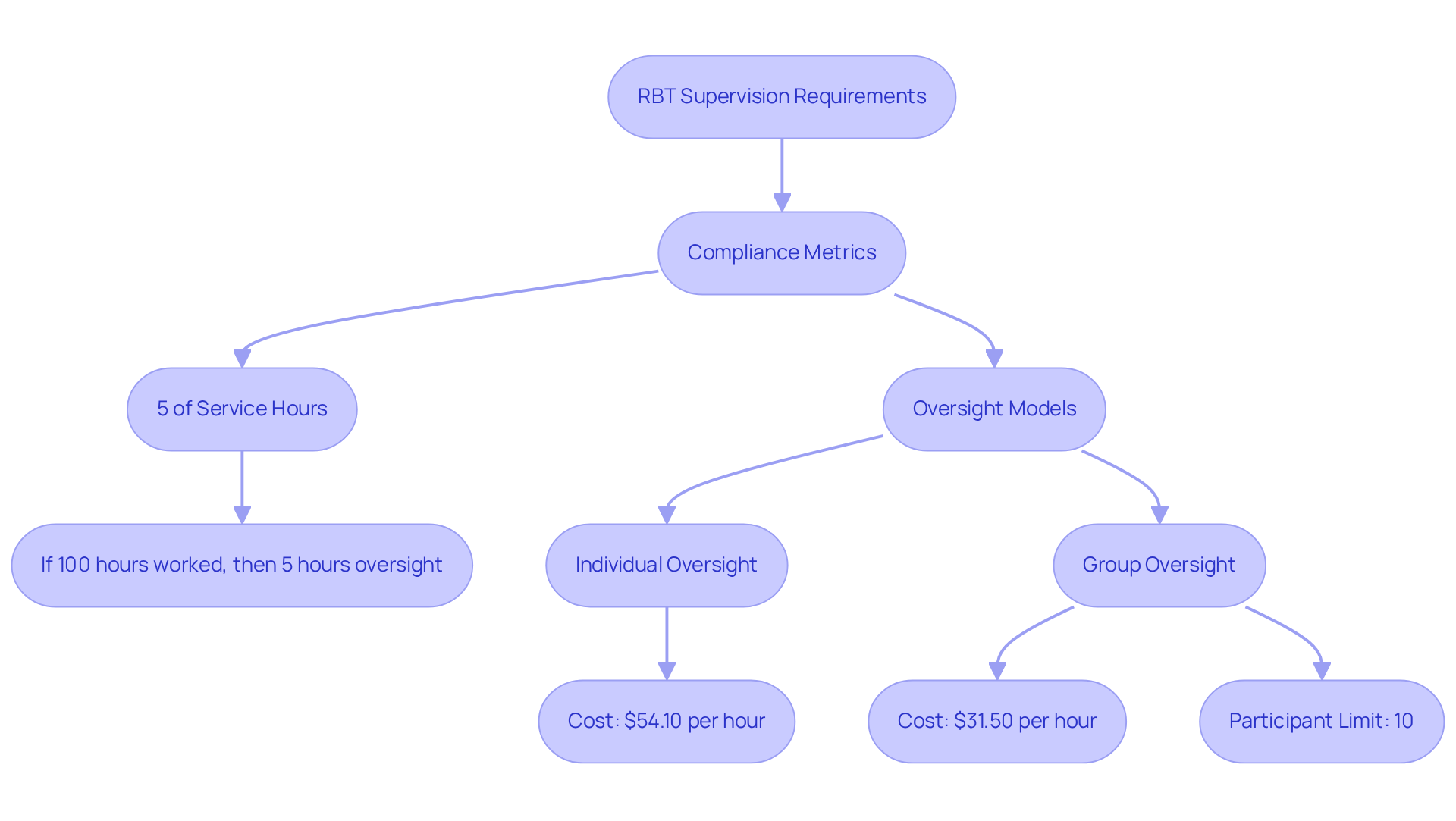
To effectively supervise Registered Behavior Technicians, individuals must meet the by possessing a current certification as a Board Certified Behavior Analyst (BCBA) or a Board Certified Assistant Behavior Analyst (BCaBA). This requirement is not merely procedural; it reflects the growing demand for qualified professionals in the field of Applied Behavior Analysis (ABA). Along with certification, completion of an 8-hour training course specifically aimed at management is essential. This training equips supervisors with the critical skills necessary to guide registered behavior technicians in a manner that adheres to ethical standards and best practices in the field.
Moreover, RBT candidates are required to meet the RBT supervision requirements by completing a minimum of 5% of their total service hours supervised each month. This ongoing supervision is vital for grasping the supervision framework and ensuring high-quality care. Registered Behavior Technicians must also fulfill a specific number of continuing education units (CEUs) within each recertification cycle, which occurs every 2 years. This requirement underscores their commitment to continuous professional development and ethical practice in ABA therapy.
Finding a qualified supervisor who meets the RBT supervision requirements is crucial, as it ensures compliance with professional standards. As Fayge Orzel states, "Supervision ensures that registered behavior technicians are providing the highest quality of care and adhering to the professional standards expected within the field." The emphasis on adequate training and certification guarantees that registered behavior technicians receive the highest standard of guidance, ultimately enhancing the effectiveness of ABA therapy. Are you facing challenges in hiring qualified supervisors? Consider the impact that proper supervision can have on your practice and the quality of care provided.
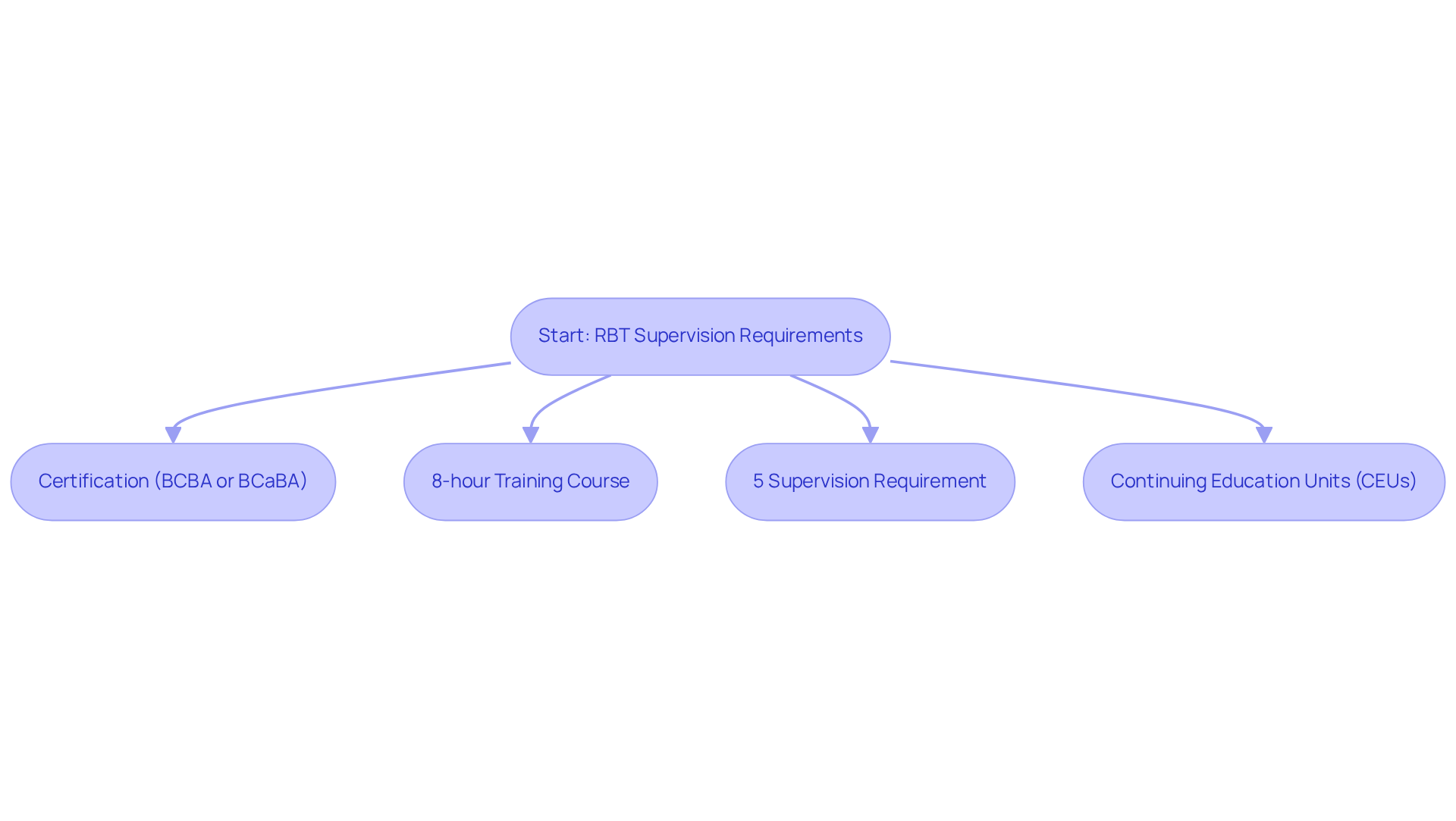
The RBT supervision requirements are a fundamental component of the RBT certification process, acting as a cornerstone for skill development and the practical application of ABA principles. Behavior technicians are required to meet the RBT supervision requirements by obtaining oversight for a minimum of 5% of their service hours each month, ensuring they receive continuous support in their practice.
Routine oversight meetings provide behavior technicians with valuable insights, enabling them to refine their methods and effectively address challenges encountered in their work. This ongoing support not only enhances practitioners' technical skills but also promotes adherence to ethical standards, ultimately resulting in .
Effective management strategies, including direct observation—where at least one session must involve face-to-face interaction—and constructive feedback, are crucial for fostering RBTs' professional growth and ensuring high-quality care in ABA therapy.
Failure to meet the RBT supervision requirements can lead to suspension or loss of RBT certification, highlighting the importance of structured and supportive guidance in the field. By prioritizing these elements, managers can significantly impact the development of RBT skills.
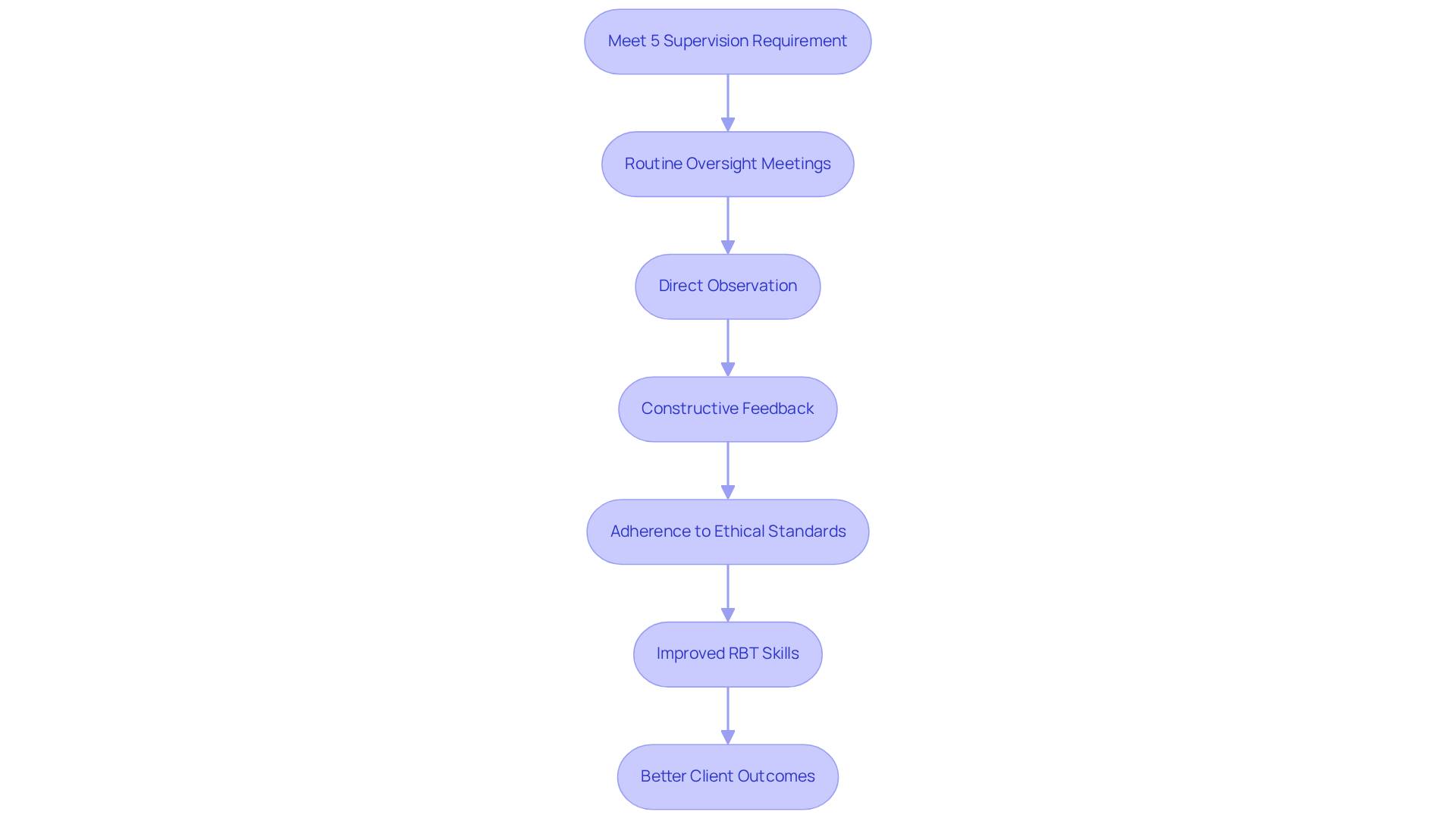
To maintain RBT certification, individuals must adhere to the , which involve engaging in continuous oversight and attending at least two in-person meetings with their guide each month. These meetings should constitute a minimum of 5% of the RBT's total service hours.
Importantly, at least half of the total oversight hours must be conducted one-on-one between the supervisor and the RBT to meet the RBT supervision requirements, underscoring the significance of personalized attention. Additionally, RBTs are required to meticulously record their oversight hours and the topics discussed during these sessions to fulfill the RBT supervision requirements and ensure compliance with BACB regulations.
As Daniel Carter aptly states, "Supervision should be seen as a requirement and an opportunity for continuous learning and development in behavior analysis." This structured approach not only fosters professional growth but also enhances the quality of ABA services provided to clients.
Effective oversight practices, which include regular face-to-face interactions and the possibility of telehealth guidance, are essential for upholding ethical standards and improving client outcomes in the field of Applied Behavior Analysis. Noncompliance with RBT supervision requirements can lead to severe repercussions, emphasizing the critical importance of efficient guidance.
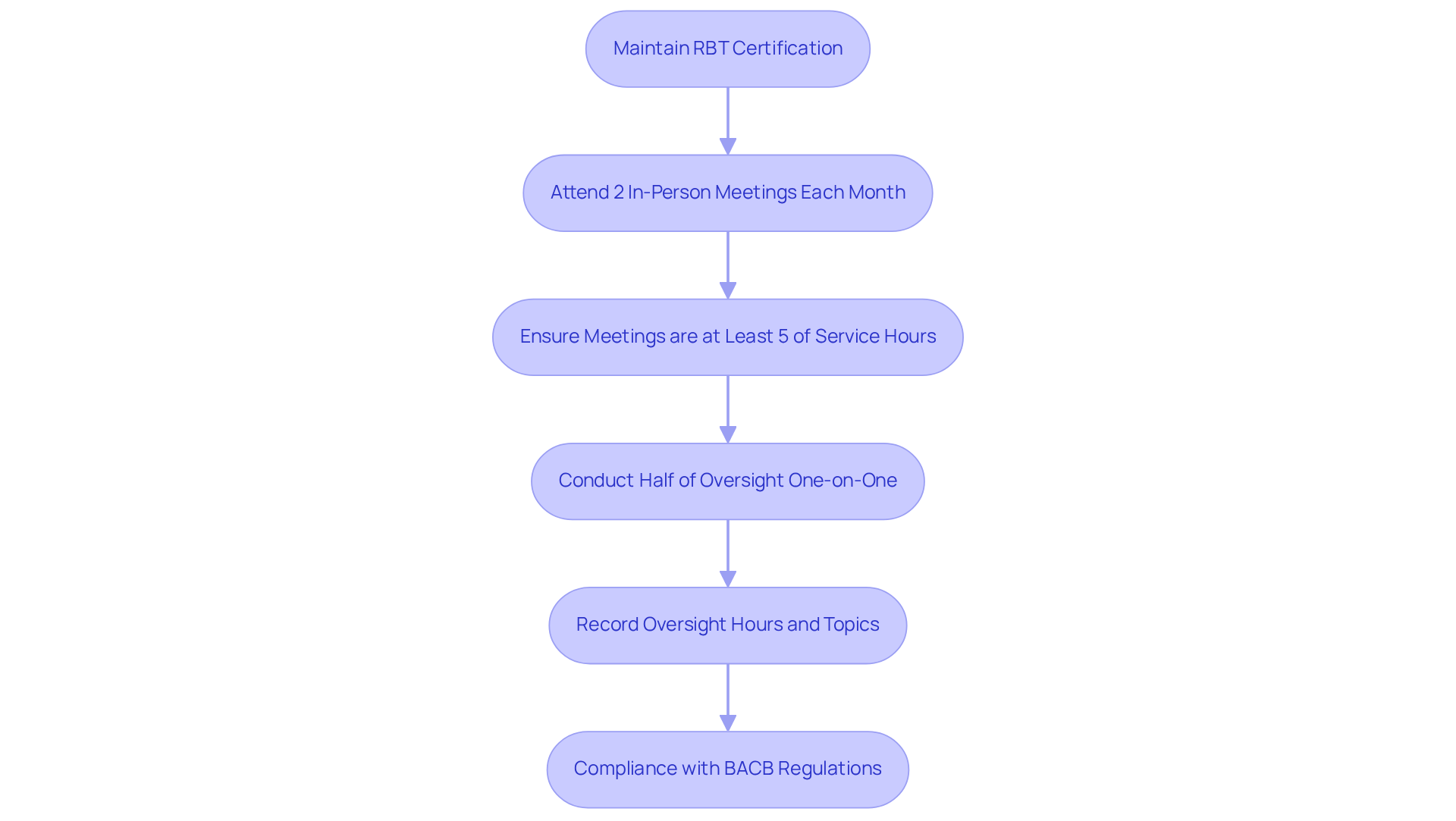
The rbt supervision requirements include that are paramount, encompassing client confidentiality, informed consent, and adherence to the BACB's ethical guidelines. Supervisors play a crucial role by modeling ethical behavior and actively encouraging registered behavior technicians to discuss ethical dilemmas encountered in practice.
Research indicates that approximately 70% of RBTs report addressing ethical challenges with their managers. This statistic underscores the significance of open communication. Such a proactive approach not only fosters a culture of ethical awareness but also enhances accountability within the ABA community, ultimately leading to improved therapeutic outcomes.
Furthermore, the ABA community must confront the lack of literature on managerial practices and promote ongoing research and development to effectively tackle oversight challenges.
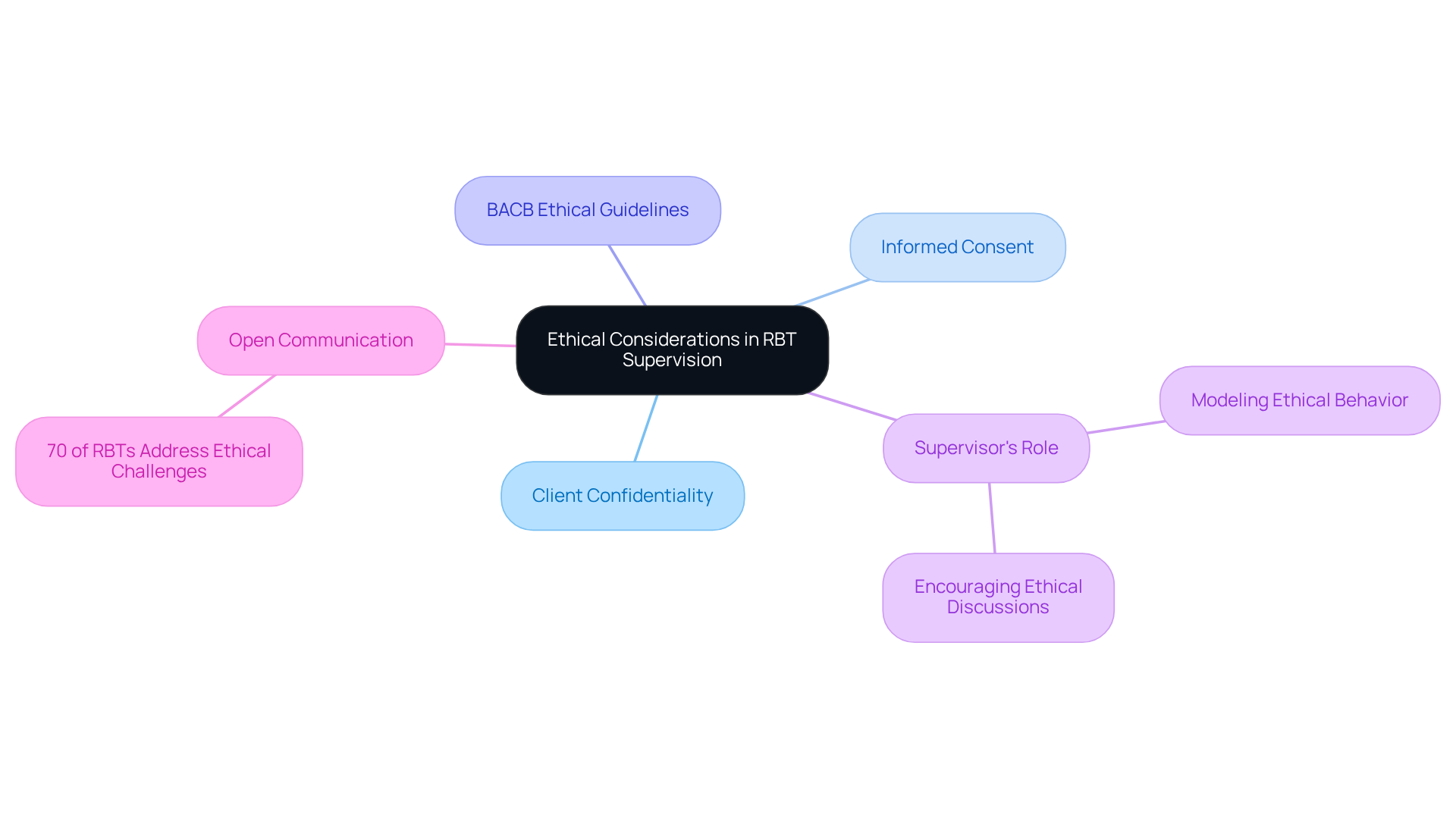
RBT supervisors play a vital role in the professional development of their supervisees by offering ongoing support and guidance. This involves carrying out regular oversight sessions, which usually take place at least twice a month, and offering constructive feedback to ensure that RBTs effectively implement behavior-analytic services.
Are you aware of the impact that effective supervision can have on client outcomes? Supervisors are responsible for maintaining precise documentation of oversight hours and the topics discussed during these sessions, as this is essential for fulfilling the RBT supervision requirements and ensuring compliance with BACB standards.
Effective oversight strategies involve direct observation and real-time feedback, which not only enhance the RBT's skills but also ensure that the RBT supervision requirements and ethical guidelines in ABA therapy are adhered to. By fostering a collaborative environment, supervisors can significantly contribute to the quality of care provided to clients. This reinforces the importance of and accountability in the field.
How can you ensure that your team is receiving the support they need to thrive?
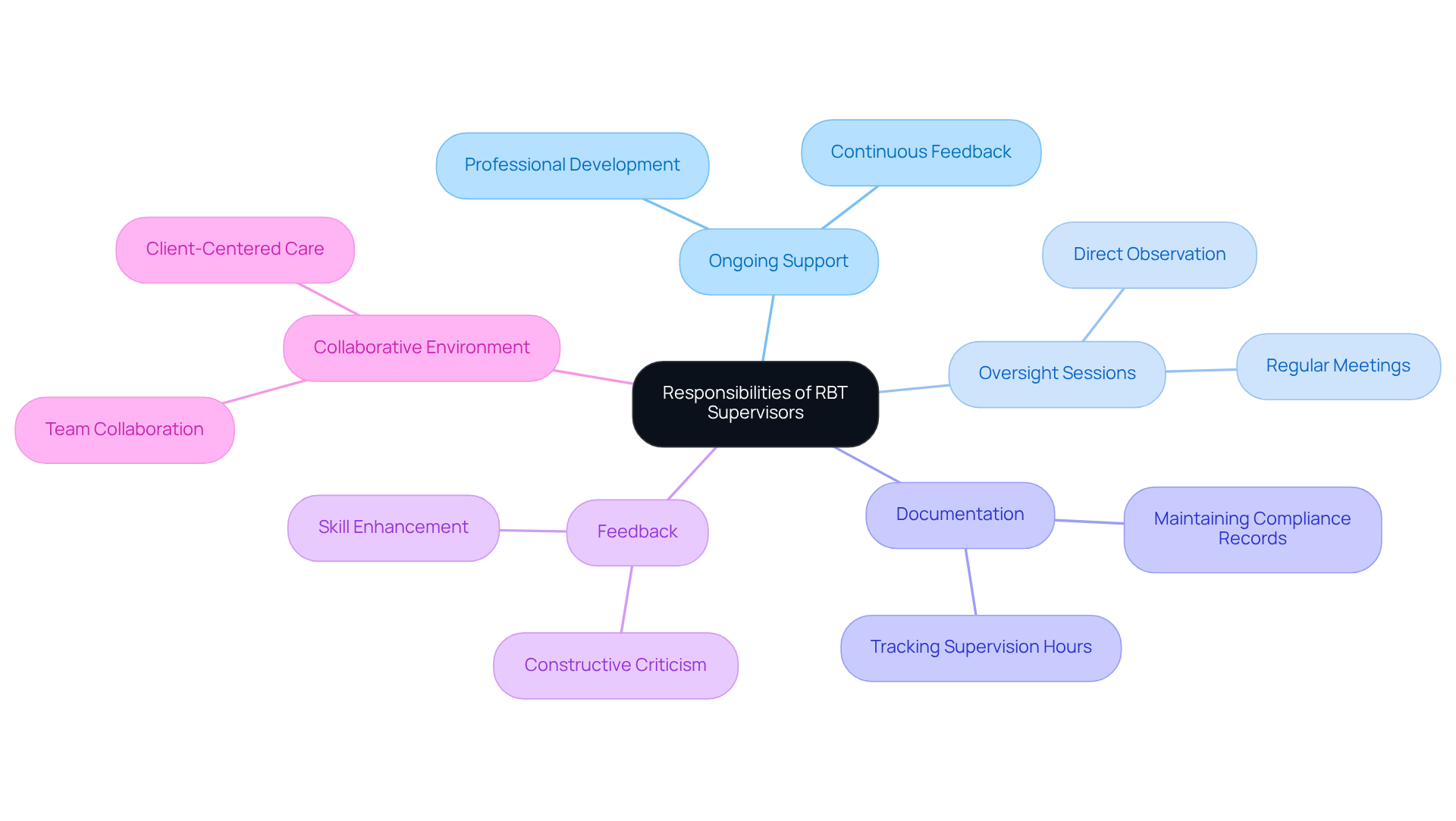
Precise documentation and record-keeping are essential components of RBT oversight. Supervisors must maintain comprehensive records of oversight sessions, including:
This documentation serves as proof that registered behavior technicians are meeting , which play a crucial role in both certification and re-certification processes. Have you considered how thorough record-keeping can enhance compliance and accountability in your practice? Registered Behavior Technicians should also diligently maintain their own documentation of oversight hours to ensure adherence to BACB standards.
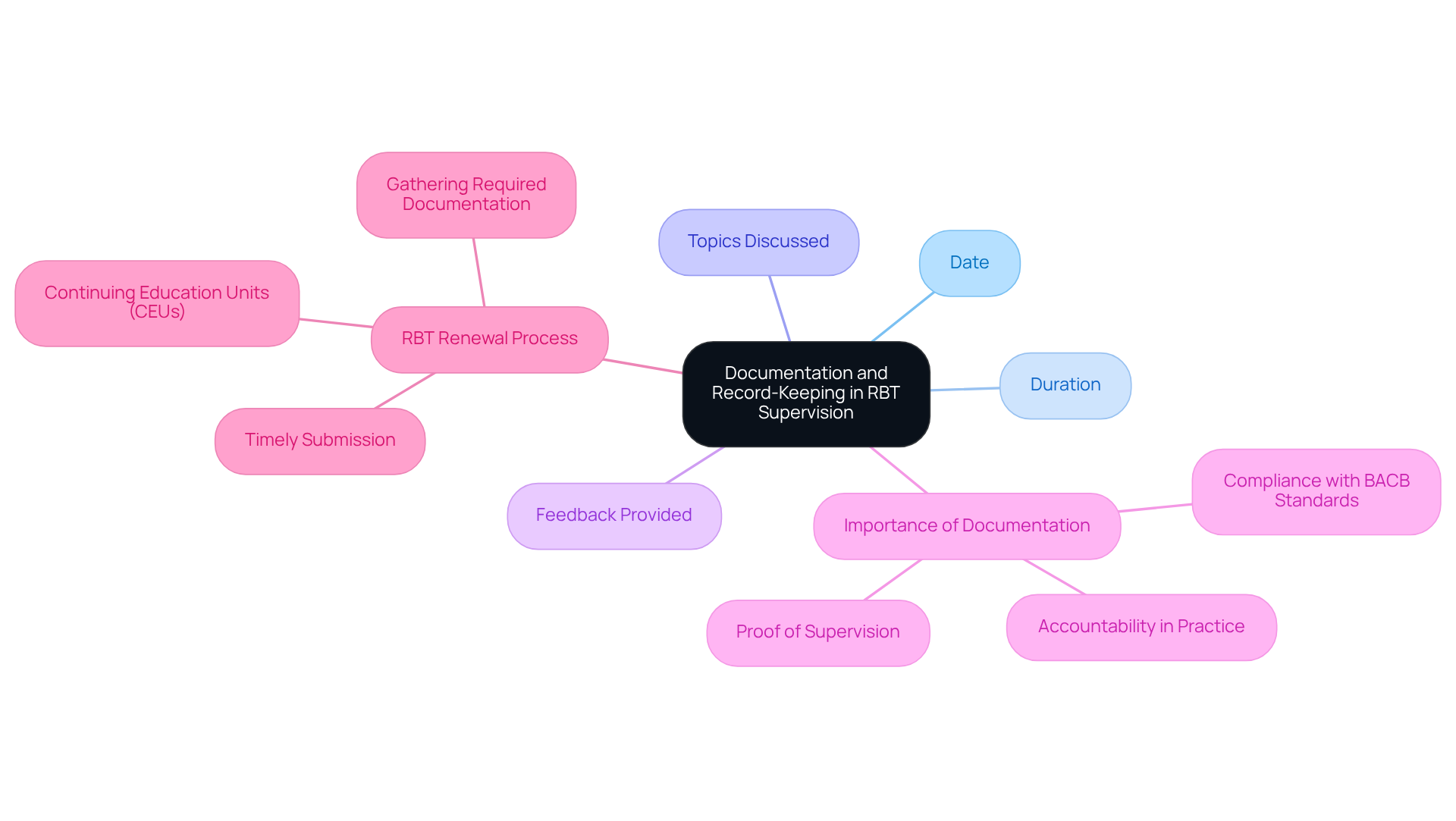
Common obstacles in RBT oversight include:
To effectively address these challenges, RBTs must proactively seek supervisors who meet and establish clear communication channels. Notably, BACB guidelines stipulate that a minimum of 5% of an RBT’s hours spent providing behavior-analytic services must be overseen, emphasizing the critical role of RBT supervision requirements in maintaining certification and ensuring service quality.
Moreover, dedicating specific time for oversight and utilizing technology for documentation can streamline the process, enhancing the overall oversight experience. As Daniel Carter aptly stated, 'RBT supervision requirements are integral to maintaining the quality and effectiveness of ABA therapy services.' By implementing these strategies, behavior technicians can significantly improve their supervisory experience and uphold the quality of their practice.
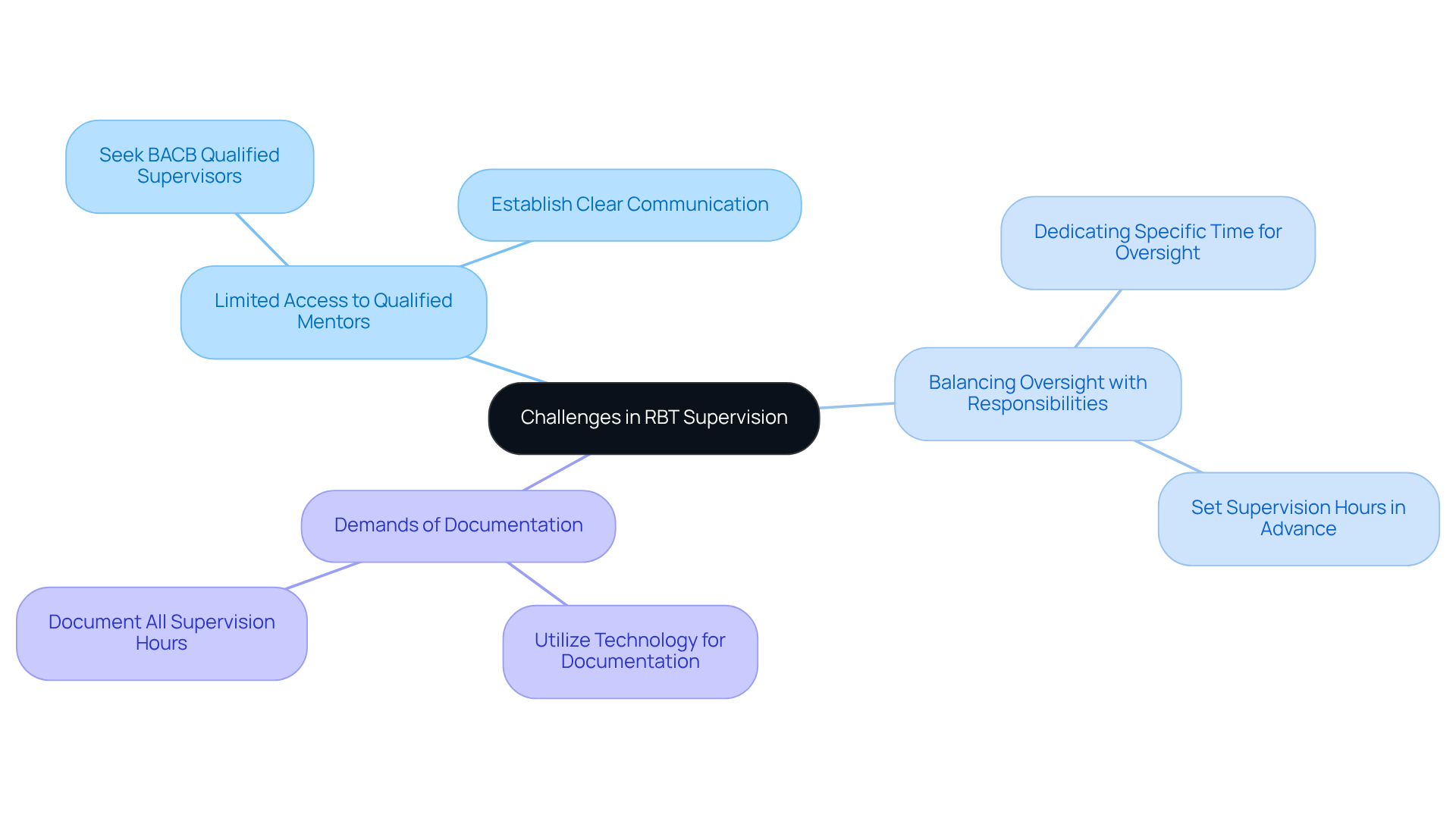
When selecting a qualified leader, registered behavior technicians must prioritize several critical factors to ensure a productive supervisory relationship. First and foremost, it is essential to verify that the manager holds a current BCBA or BCaBA certification and has completed the requisite supervision training. This certification not only signifies their expertise but also guarantees adherence to the ethical standards established by the Behavior Analyst Certification Board (BACB), particularly the significant updates made to Section 4 of the BACB Ethics Code as of January 1, 2022.
Additionally, RBTs should assess the experience level of their mentor; those with a strong background in ABA practices are better positioned to offer meaningful guidance and support. Effective communication skills are paramount; managers must articulate feedback clearly and constructively, fostering an environment conducive to professional growth. Monitoring sessions should occur at least twice a month to facilitate effective training.
Moreover, a demonstrated commitment to ethical practices is crucial, as it underpins the integrity of the supervisory relationship and ultimately influences client outcomes. By focusing on these criteria, behavior technicians can select supervisors who will enhance their training and development in the realm of ABA therapy. Flexibility in scheduling oversight sessions is also vital, as it significantly affects their ability to meet RBT supervision requirements. Utilizing resources from the BACB, such as the , can further bolster the effectiveness of oversight and ensure compliance with ethical practices.
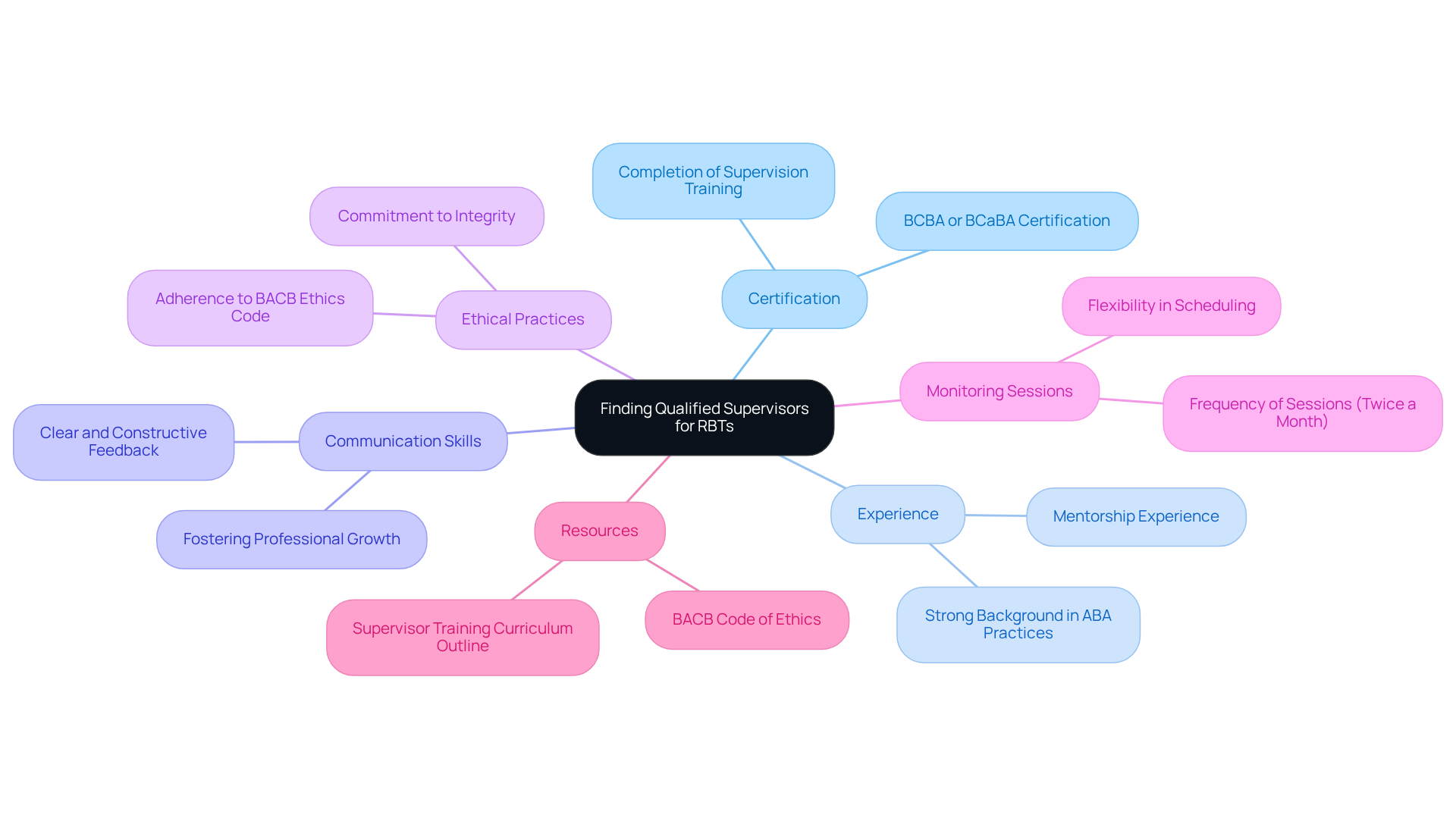
The demand for Board Certified Behavior Analysts (BCBAs) is projected to grow by an impressive 25% by 2026. In this evolving landscape, Hire ABA stands as a pivotal resource, dedicated to connecting BCBAs with top-tier job opportunities in the field of Applied Behavior Analysis. By utilizing advanced job fit scoring, we identify opportunities that align seamlessly with the skills, preferences, and desired locations of BCBAs.
Our personalized guidance and comprehensive support streamline the hiring process, ensuring that qualified professionals find roles that match their expertise and career aspirations. Have you faced challenges in navigating the hiring landscape? Hire ABA can address these issues effectively, providing you with the tools necessary for success.
In addition to supporting BCBAs, we also offer resources and support for Registered Behavior Technicians (RBTs) to help them fulfill RBT supervision requirements. This includes:
Whether you are an aspiring RBT seeking guidance or looking to mentor, Hire ABA is your trusted partner in navigating the complexities of RBT supervision requirements as well as career development.
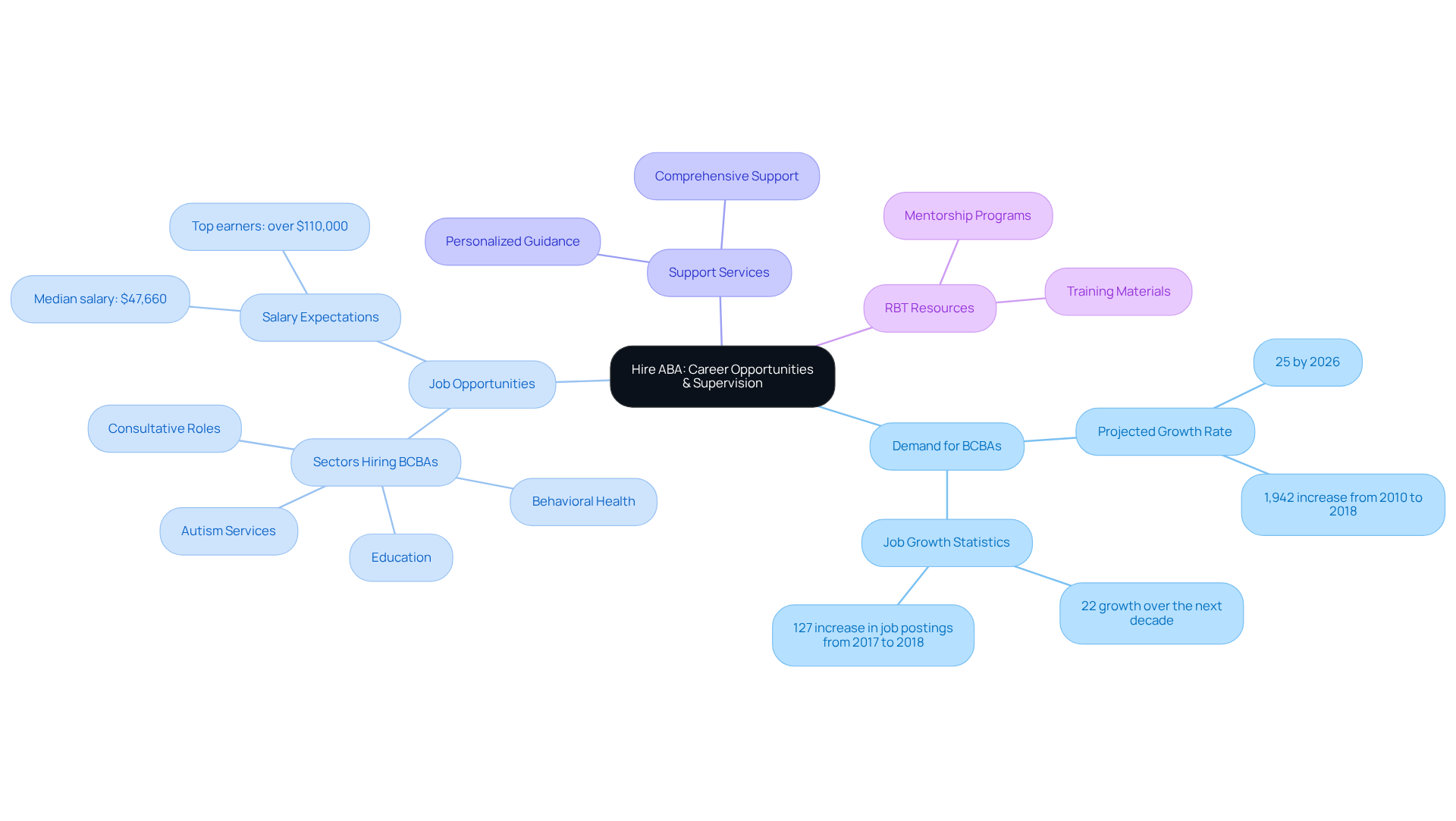
Understanding and adhering to RBT supervision requirements is crucial for aspiring technicians in the field of Applied Behavior Analysis. These guidelines not only ensure compliance with the Behavior Analyst Certification Board (BACB) standards but also play a significant role in the professional growth and ethical practice of Registered Behavior Technicians (RBTs). By receiving adequate supervision, RBTs can enhance their skills, improve client outcomes, and maintain their certification.
Throughout this discussion, key points such as the necessity of obtaining at least 5% oversight of service hours, the importance of qualified supervisors, and the ethical considerations inherent in RBT supervision have been emphasized. Additionally, the challenges faced by RBTs in securing effective supervision and the strategies that can be employed to overcome these obstacles have been highlighted. By focusing on documentation, communication, and ongoing professional development, RBTs can navigate their supervisory requirements more effectively.
Ultimately, the significance of RBT supervision cannot be overstated. It serves as the backbone of effective ABA practice, ensuring that technicians are well-equipped to provide high-quality care. Aspiring RBTs and their supervisors should prioritize these requirements not just for compliance, but as a pathway to excellence in the field. Engaging with resources like Hire ABA can further enhance this journey, providing support and guidance in navigating the complexities of RBT supervision and career advancement.
What are the RBT supervision requirements?
Registered Behavior Technicians (RBTs) must obtain oversight for at least 5% of their total service hours each month. For example, if an RBT works 100 hours in a month, they need a minimum of 5 hours of oversight.
What types of oversight are included in RBT supervision?
RBT supervision includes both direct observation and indirect guidance, which are essential for maintaining ethical standards and enhancing skill development.
What are the consequences of non-compliance with RBT supervision requirements?
Non-compliance can result in serious consequences, including a potential six-month revocation of RBT certification.
What are the formats of effective oversight in ABA therapy?
Effective oversight can be provided in both individual and group formats, with group guidance limited to 10 participants to promote collaborative learning.
What are the costs associated with RBT supervision?
The cost of individual oversight is typically $54.10 per hour, while group oversight is priced at $31.50 per hour.
Who can serve as supervisors for RBTs?
Supervisors must be qualified Board Certified Behavior Analysts (BCBAs) or Board Certified Assistant Behavior Analysts (BCaBAs).
What is the role of supervisors in RBT training?
Supervisors deliver constructive feedback and monitor the implementation of behavior intervention plans (BIPs), ensuring that RBTs adhere to ethical standards and best practices.
What organizational structures should be established for RBT supervision?
Organizations should establish the RBT Requirements Coordinator Structure for extensive operations and the RBT Supervisor Structure for smaller entities to ensure efficient oversight.
What educational prerequisites must supervisors meet?
Supervisors must have current certification as a BCBA or BCaBA and complete an 8-hour training course focused on management.
How often must RBTs complete continuing education units (CEUs)?
RBTs must fulfill a specific number of CEUs within each recertification cycle, which occurs every 2 years.
Why is supervision important for RBTs?
Supervision is crucial for ensuring RBTs provide high-quality care, adhere to professional standards, and receive ongoing support in their practice.
Our expert recruitment strategies and AI-driven sourcing ensure that you receive top-notch candidates quickly, without compromising on quality. Whether you’re looking for BCBAs, Clinical Directors, or RBTs, we’ve got you covered.